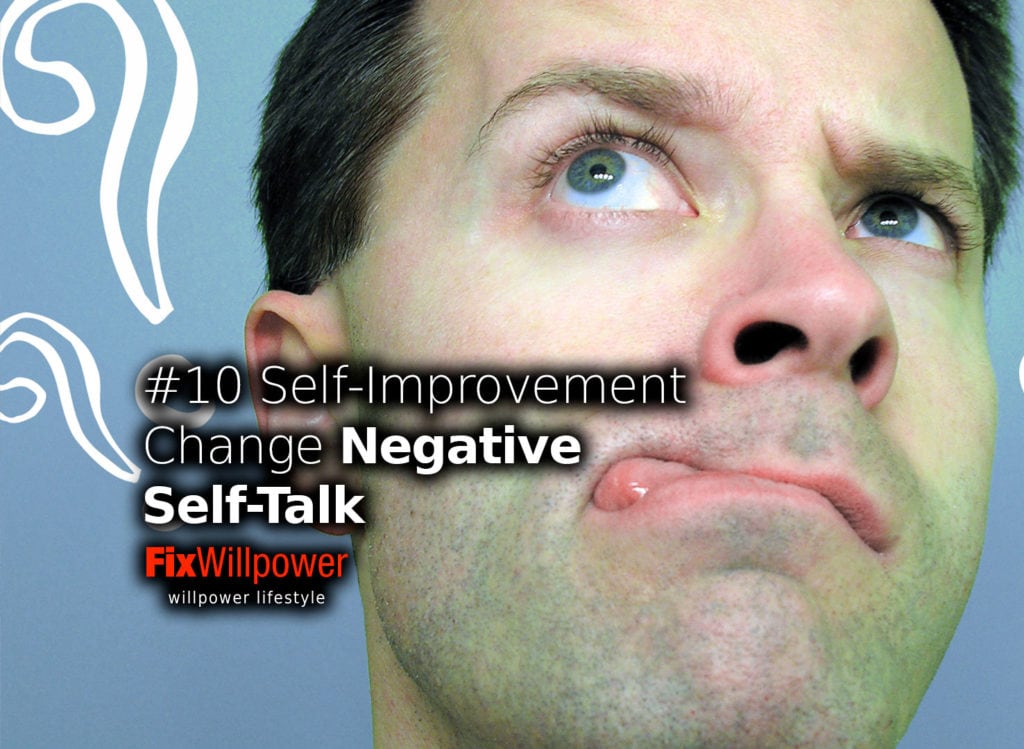We are often mean to ourselves.
Our self-talk is the way we talk to ourselves in our minds.
Let’s figure out how to beat negative self-talk.
“What is wrong with me?” is not a good question. Find out what is negative self-talk and how do you change it?

Almost everybody uses some self-talk. People consider ideas, make decisions, and react to events by talking about them in their heads. Some people don’t even realize that they talk to themselves. I didn’t know that. I wanted to know how my friend talks to himself and asked about his self-talk.
He answered, “No, sir! I don’t talk to myself!”
It threw me off a bit, and I asked how do you think? What happens when you think? He considered that for a moment and said, “Oh! It seems I talk to myself, after all.”
Becoming aware of how you use self-talk or the internal monologue in various situations will help you understand what you really want and improve your entire life.
Of course, the first step is to notice your self-talk.
Then you can do something about it.

Willpower challenge: Every time a negative thought enters your mind, think 3 positive ones. Train yourself to flip the script.
What is negative self talk?
Negative self-talk happens when something goes wrong.
Our inner critic will nag about what happened. It can be either you blaming yourself for what happened or telling yourself that you deserved this negative outcome. In the first case, you are downplaying your abilities, and in the other, you question your worth as a human being.
Criticizing yourself constantly is not the way to improve your life. Don’t beat yourself up every time something doesn’t go the way you intended or expected.
I once read that if our boss would talk to us as we speak to ourselves, then we would quit immediately. So, don’t beat yourself up, there’s nobody to stand up for you. Encouragement and positive reinforcement are a much better way to go about it if you want to achieve results.
Find out how to build the skill of self-confidence in this video from Dr. Ivan Joseph.
Important note: some people do not have self-talk
We learn all the time. Some time ago I found out that some people do not have self-talk. Here’s the video where I first found out about the other type of thinking.
I have to say that I don’t even begin to understand what that means or how it feels. But I believe those people think. So, so they have positive self-think and negative self-think.
Even if they don’t self-talk, the avoid negative self-think still applies.
If you are a person who doesn’t use self-talk, let me know in the comments, if this applies to you at all. Or you can email me directly.
How to stop negative self-talk?
Don’t ask “why me,” ask how can I fix it or avoid it in the future. Your self-talk should be about encouragement and self-improvement so you can learn something from every experience.
Now, let’s look at how to change negative self-talk to positive step-by-step using the following negative self-talk exercises or to frame it correctly positive self-talk exercises:
1. Pay attention to your self-talk
First, pay attention to how you talk to yourself.
Notice both positive and negative self-talk, understand which happens in what situations. Try to be neutral and just appreciate what goes on in your head.
2. Start changing your self-talk
Think about ways you can replace your negative self-talk with positive thinking.
If you stumble on a pebble, don’t tell yourself how clumsy you are, note the event and remind yourself to be more careful on uneven terrain.
Research shows (Hatzigeorgiadis et al.) that positive self-talk as opposed to the negative self-talk reduces anxiety and increases concentration and self-confidence. Another study found that negative self-talk was associated with worse performances.
3. Replace negativity with positive thoughts
You will have to replace negative self-talk with positive self-talk every time it happens.
You will always have the inner voice in your head. When a negative thought enters your mind, you just have to replace the attitude.
When changing negative self-talk, you may find that sometimes negativity can be appropriate. But most of the time, positive reinforcement is better and negativity.
Now, gradually replace negative self-talk with positive.
When you make mistakes, don’t yell in your head “Stupid!” or “Idiot!” consider what happened and what you can learn from it (you either win some or learn some).
Decide how to be better next time. If something bad happens to you, don’t start the endless “Why me?” cycle. We, humans, are smart and we’ll always find an answer to “why me” question and it will not improve our day.
Think about what you can learn from the experience and understand that this was just a statistical probability catching up with you, not a deep flaw in your character.
4. Building a positive self-talk habit
It takes a lot of time to change the way we think. Research suggests that it takes on average 66 days for a habit to stick.
Make a habit out of positive self-talk.
Become excellent at catching yourself when you slip into negativity and your days will be a lot lighter. Don’t forget to give yourself some credit every now and then.

If you hear a voice within you saying, You are not a painter, then by all means paint, and that voice will be silenced. ~ Vincent van Gogh
Use the second or third person in your self-talk
Research has shown that you will get better results when you replace “I”, “me”, or “my” in your self-talk. Use “you”, “he”/”she”, your first or last name instead. These studies show that third-person self-talk may be relatively effortless form of self-control. For example:
First-person self-talk: “I should not eat that cookie!”
Replace it with: “You should not eat that cookie!” or “John, don’t eat that cookie!” or better yet give yourself a reason “John, think how much better you would feel about yourself if you don’t eat that cookie.”
Example of third-person self-talk
Don’t use: “Stupid me, I didn’t go to the gym again because I’m so lazy”.
Use: “Paul, you will improve a lot faster when you exercise every day.”
Look at how to improve your life with self-affirmations that are part of your self-talk.
Watch this negative self-talk video and get a better understanding how important it is to be nice to yourself.
Science says talking to yourself is a good thing
The impact of verbal instructions on goal-directed behavior: The experiments show that relevant verbal instructions boost sustained concentration on task goals when maintaining multiple tasks.
Self-Directed Speech Affects Visual Search Performance: People searched for common objects and were sometimes asked to speak the target’s name aloud. Speaking helped search, particularly when there was a strong association between the name and the visual target.
Mechanisms underlying the self-talk–performance relationship: Self-talk can enhance self-confidence and reduce cognitive anxiety. Increase in self-confidence may explain the effects self-talk has on performance.
Self-Talk and Sports Performance: Self-talk interventions were more effective for tasks involving relatively fine motor demands, and for novel tasks. Instructional self-talk was more effective for fine tasks than was motivational self-talk. The results of the study encourage the use of self-talk to aid learning and enhance performance.
Negative self-talk quotes

Your self-talk has a direct bearing on your performance. ~ Zig Ziglar
–

Positive self-talk is to emotional pain as pain pill is to physical pain. ~ Edmond Mbiaka
–

Be vigilant, guard your mind against negative thoughts. ~ Anonymous
How to replace negativity in your thoughts?
And then there are the dark days when you just can’t shake the onslaught of negative emotions.
Force yourself to smile; science says it helps.
Prepare a list of good things about yourself. Read that list when you are down.
Sometimes I find my kid in a “why me” or “I’m too stupid to do this” loop. I ask him to apologize to himself and list the reasons why the things he said are not true. You can try this yourself, or with your kids, so they get the right mindset early on how to avoid negative self-talk.
You can replace every “why” with “how.” How’s are mentally taxing, and you need to focus. Every time you think you are not worthy, consider the things you are good at. Walking, breathing, coming up with horrible things to say about yourself, and other activities you have mastered.
________________
Image freeimages.com
![Read more about the article 6 Rules of Success [VIDEO] Arnold Schwarzenegger: Trust Yourself](https://fixwillpower.com/wp-content/uploads/trust-arnold-schwarzenegger-429x314.jpg)
![Read more about the article Call An Old Friend to Keep in Touch and Build Your Network [STEPS]](https://fixwillpower.com/wp-content/uploads/call-an-old-friend-429x314.jpg)
![Read more about the article All the Ways Attitude of Gratitude Improves Your Life [VIDEO]](https://fixwillpower.com/wp-content/uploads/attitude-of-gratitude-improve-your-life-429x314.jpg)
![Read more about the article How to Find and Do Work You Love: Scott Dinsmore [VIDEO]](https://fixwillpower.com/wp-content/uploads/work-you-love-429x314.jpg)
Pingback: The Skill of Self Confidence by Dr. Ivan Joseph [TED VIDEO] | Fix Willpower
Pingback: Improve Your Life #29: Fake It Till You Make It | Fix Willpower